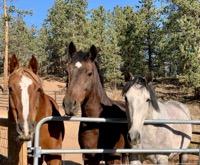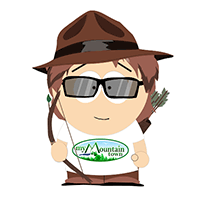Taxing
- DavisRanch
-
 Topic Author
Topic Author
- Leaf Peeper
-

Less
More
15 Apr 2011 07:11 #1
by DavisRanch
Taxing was created by DavisRanch
What is the most taxing thing we do with or for our horses?
For me, it's finding the right professionals to help with whatever needs to be done--farriers, veterinarians, trainers (yes, I send my horses to a trainer if I am unable to teach them a particular task, like Arabian Halter showing for example).
There are certain criteria I look for in the folks who will be working with my horses. Here is a list of a few of the things I want:
--In each person, I want someone who is respectful and kind, but firm when handling my horses.
This means that a farrier will never raise a rasp to my horse and will understand that an older, arthritic horse can't lift that hind leg as high as he once could so romping on him for not being able to stand for a 30 minute trim isn't the way to go.
--I want someone who I can talk to and get the information I need easily and the person should also be able to listen to my horse's needs as well. Knowledge counts, but dispensing it is equally important.
--Each should have the training, credentials and references to back their business cards.
References are the tricky part here since many horse owners choose their vets, farriers and trainers based on how that person makes them feel rather than on how well they do their job. I want references but prefer to get them from my own knowledge base and my horse's responses.
Experience counts. For me, the certification of some means little to nothing if they don't also have the experience to back their claim to fame. I watch them and the results they achieve or don't achieve and choose them accordingly.
--Fees count. This doesn't mean I look for the least expensive, it means that the fees charged should line up with the service received and the claims made.
For each of us, we must choose the things we most want in the people we work with, prioritze the list and be willing to move on if a certain person doesn't ultimately match up with us or our horses.
Here is how I've decided to hire someone to work with my horses:
* Interview--ask many questions. If you need a lameness vet, ask them if they're good at lameness exams or better, ask what their chosen concentration is. If it is dentistry or reproduction, you may want to keep looking for a leg-(wo)man.
* Observe--Watch a trainer work with both a horse and a student before hiring them. Do they teach through a variety of methods or simply follow a lesson by rote? Do you like how they approach your horse? Does your horse like them or raise his head and avoid?
* Communicate--Talk about your own expectations. If you want to keep your horse barefoot, make sure that the farrier you hire is on-board with that practice and not always gunning to shoe your horse until you feel guilty and unsure.
Be careful when you choose people to work with your horse since every single time a human is near a horse, he or she is training the horse. Are they influencing your horse as you choose?
Happy Trails and as always, the following applies:
*******PRIVATE one hour riding lesson for $50, (normally $75) with mention of [url=http://www.285Bound.com" onclick="window.open(this.href);return false;]http://www.285Bound.com[/url], email ; must be within 20 miles of Conifer, CO.
; must be within 20 miles of Conifer, CO.
Tanya Buck was born and raised in Carmel, California, where she grew up on a small ranch. A graduate of UC Davis, she majored in Animal Science with a concentration in Equine Reproduction, and a minor in English.
She is certified through UC Davis as an Equine Breeding Manager, is a certified horse show judge, and a Reiki Master. Currently, Tanya and her husband live in the Rocky Mountains of Colorado with five horses, three dogs, three cats, a couple of parrots and a bunch of fish.
Besides her passion for horses, Tanya is an avid Scuba diver, an active bicyclist, and loves to hike, snowshoe, read and write. She is currently working on two books, one fiction that needs an agent now, and a creative nonfiction about training horses written from the horse's point of view.
Tanya has been helping to bridge the communication gap between horses and humans for over 35 years.
For me, it's finding the right professionals to help with whatever needs to be done--farriers, veterinarians, trainers (yes, I send my horses to a trainer if I am unable to teach them a particular task, like Arabian Halter showing for example).
There are certain criteria I look for in the folks who will be working with my horses. Here is a list of a few of the things I want:
--In each person, I want someone who is respectful and kind, but firm when handling my horses.
This means that a farrier will never raise a rasp to my horse and will understand that an older, arthritic horse can't lift that hind leg as high as he once could so romping on him for not being able to stand for a 30 minute trim isn't the way to go.
--I want someone who I can talk to and get the information I need easily and the person should also be able to listen to my horse's needs as well. Knowledge counts, but dispensing it is equally important.
--Each should have the training, credentials and references to back their business cards.
References are the tricky part here since many horse owners choose their vets, farriers and trainers based on how that person makes them feel rather than on how well they do their job. I want references but prefer to get them from my own knowledge base and my horse's responses.
Experience counts. For me, the certification of some means little to nothing if they don't also have the experience to back their claim to fame. I watch them and the results they achieve or don't achieve and choose them accordingly.
--Fees count. This doesn't mean I look for the least expensive, it means that the fees charged should line up with the service received and the claims made.
For each of us, we must choose the things we most want in the people we work with, prioritze the list and be willing to move on if a certain person doesn't ultimately match up with us or our horses.
Here is how I've decided to hire someone to work with my horses:
* Interview--ask many questions. If you need a lameness vet, ask them if they're good at lameness exams or better, ask what their chosen concentration is. If it is dentistry or reproduction, you may want to keep looking for a leg-(wo)man.
* Observe--Watch a trainer work with both a horse and a student before hiring them. Do they teach through a variety of methods or simply follow a lesson by rote? Do you like how they approach your horse? Does your horse like them or raise his head and avoid?
* Communicate--Talk about your own expectations. If you want to keep your horse barefoot, make sure that the farrier you hire is on-board with that practice and not always gunning to shoe your horse until you feel guilty and unsure.
Be careful when you choose people to work with your horse since every single time a human is near a horse, he or she is training the horse. Are they influencing your horse as you choose?
Happy Trails and as always, the following applies:
*******PRIVATE one hour riding lesson for $50, (normally $75) with mention of [url=http://www.285Bound.com" onclick="window.open(this.href);return false;]http://www.285Bound.com[/url], email
Tanya Buck was born and raised in Carmel, California, where she grew up on a small ranch. A graduate of UC Davis, she majored in Animal Science with a concentration in Equine Reproduction, and a minor in English.
She is certified through UC Davis as an Equine Breeding Manager, is a certified horse show judge, and a Reiki Master. Currently, Tanya and her husband live in the Rocky Mountains of Colorado with five horses, three dogs, three cats, a couple of parrots and a bunch of fish.
Besides her passion for horses, Tanya is an avid Scuba diver, an active bicyclist, and loves to hike, snowshoe, read and write. She is currently working on two books, one fiction that needs an agent now, and a creative nonfiction about training horses written from the horse's point of view.
Tanya has been helping to bridge the communication gap between horses and humans for over 35 years.
Please Log in or Create an account to join the conversation.
- Crazy Heart
-

- User is blocked
-

Less
More
- Posts: 70
- Thank you received: 0
17 Apr 2011 10:16 #2
by Crazy Heart
Replied by Crazy Heart on topic Taxing
Thanks for the info, great information.
Please Log in or Create an account to join the conversation.
Time to create page: 0.143 seconds







